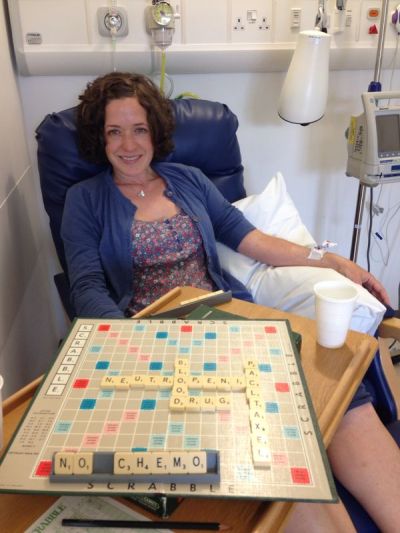http://www.breastcancercare.org.uk/news/blog/my-christmas-wishes
As I write this post, the festive season is upon us. Admittedly I’m not that keen on Christmas. I’ve always felt more ‘Bah! Humbug!’ than ‘Ho, ho, ho’ about Yuletide. All that forced jollity makes me turn all Ebenezer. But, ’tis the season to be jolly, so in an attempt to rekindle the joy and excitement of Christmas past, I’ve decided to write to Santa Claus and see if he can make some of my festive dreams come true.

Dear Santa…
It’s been a few years since I last wrote to you and, although I’m not one to hold a grudge, you never did give me that pony. OK, maybe I was asking for a bit much, but what about the Barbie house and the Cabbage Patch Kid? I know you’re busy, but you’ve got some serious making up to do.
Here is my wish list in no particular order.
1) I’d like my old body back please. I was more than happy with the old one. Perhaps my boobs were a little wonky but they were a damn sight prettier than what’s there now. I realise this is a tall order, but can you please erase the scars and the general wonkiness this disease has inflicted on my body. I’m not asking for much, just a little symmetry.
2) While we’re on the subject of boobs – can I have a new nipple please? The one that was started earlier this year never got finished. I am still ‘blind’ on one side. Yes I’ve got secondary cancer, but I’d still like to look normal. I don’t think this is too much to ask. By the way, I’m curious to know what happens to all the old nipples? Is there a nipple heaven? This is a question that fascinates me and my nipple-less friends.
3) Oh, and I’d like some tattoos. You know the kind of thing – something pretty, floral and feminine that might also disguise some of the scars. I reckon if you find a clever tattoo artist they might even be able to make me look symmetrical.
4) I’d also like some padding (like a ‘foob’ or prosthesis but bigger) for my right buttock. Perhaps I should elaborate. My right buttock came to the rescue in my hour of need (tissue from my bottom was used to create my reconstructed breast) and is now quite literally staring me in the face. I’m very grateful to my derriere for helping me out, but it’s left me slightly lopsided. This can make life quite uncomfortable. Have you tried riding your sleigh with one butt-cheek?
5) Can I have some more hair please – but only on my head? Anything below the nose is surplus to requirement. You know what I’m talking about, Santa. Those pesky chin hairs and the pubic triangle, which for some reason always grows back quicker than anything else. Isn’t there a button you can press to make the head-hair grow faster? It’s winter, my head is cold and I’m fed up with people thinking my crew cut is a ‘lifestyle’ choice. And no, a wig won’t suffice. I want real hair, the kind that clogs up the bath. I want to swish again!
6) This is a big ask, but can you please transport me back to my old life for just one weekend? I’d like to remember what it’s like to wake in the morning without the cloud of cancer slapping me in the face. I promise I won’t take anything for granted ever again. Please.
7) Can you ask one of your elves to create a dating website for people with life-limiting illnesses? Secondary cancer isn’t exactly what you’d call a big selling point. We single folks need some help with marketing ourselves. Friends tell me that the dating world is full of commitment-phobic men, so perhaps we’re at an advantage? Here’s my profile header to get you started: ‘Breast cancer patient seeks understanding man with dark sense of humour for short-term commitment. Must like scars.’
8) I want to grow old and wrinkly. No, really I do. Before my cancer diagnosis I used to slather my face in Boots ‘Protect and Perfect’ anti-ageing serum. Nowadays my benefits payments don’t stretch to wrinkle cream, and even if they did I wouldn’t waste the money. Wrinkles are now very low down my list of priorities. Everyone else is obsessed with staying young, but I want to grow old. I’ll never be a grandparent, or even a parent, but I’ll gladly settle for being a dotty old aunt.
9) Can you please give me and all the other women living with this horrific disease a little more time? I’m sure most of us would settle for chronic disease status, until they find the elusive cure. I’d happily trade all of the above if you can give us all a little more time. Actually, make that a lot more time.
10) They keep saying we’re going to ‘beat cancer sooner’. This is a bit too vague for me and everyone else living with cancer. Sooner can’t come soon enough. I’d be really grateful if you can ask ‘them’ to be more specific and perhaps bring sooner forward. I’ve got a life to plan, and I’d like to put some dates in the diary.
I realise I’ve already given you a big list and I know it can be difficult shopping for other people. If you’re still looking for inspiration though, I’d also like a new dressing gown, some Liz Earle No. 15 perfume, a Vitamix, some Diptyque candles and some new slippers.
It’s not long till Christmas, Santa. You’d better get to it!
Katherine
PS Merry Christmas
You can read more from Katherine on her own blog killerkath.wordpress.com and also on Twitter @killerkath
Vita bloggers’ views are their own and do not necessarily represent those of Breast Cancer Care or Vita magazine.





